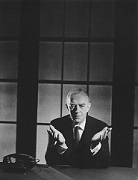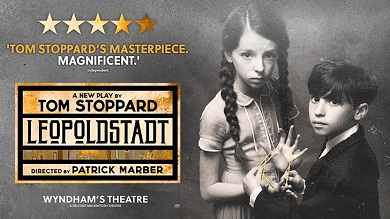Leopoldstadt
Whilst a new play by 82 year old Tom Stoppard is a significant theatrical event, your correspondent cannot be numbered amongst his greatest fans.
For me he is more of a wordsmith than a playwright and too clever by half. He has a talent for comic writing but I have always felt unfulfilled by his plays.
Leopoldstadt is one of those broad sweep plays like, but not as good as, The Lehman Trilogy following 3 generations of the Merz and Jaobovitz families. It starts in 1899 at a Jewish Passover service where the scion of the family Herman Merz (Adrian Scarborough) is conflicted between his Austrian patriotism and also his Jewish roots and non-observance.
 The drama moves from 1899 to 1900, to 1924, to 1938 and 1955 but always set in Leopoldstadt – once a wealthy Jewish part of Vienna.
The drama moves from 1899 to 1900, to 1924, to 1938 and 1955 but always set in Leopoldstadt – once a wealthy Jewish part of Vienna.
Vienna at the turn of the twentieth century was like Paris in the 1920s and London in the 60s – one of those places that produced a number of talented people: Sigismund Freud, Gustav Klimt, Stefan Zweig, Mahler, Schnit??zler – all of these except Klimt being Jewish.
 However the real inspiration, as three pages in the progamme explain, is Stoppard’s discovery that he is less Czech but actually Jewish. It this conflict between Judaism and nationality that lies at the heart of the play.
However the real inspiration, as three pages in the progamme explain, is Stoppard’s discovery that he is less Czech but actually Jewish. It this conflict between Judaism and nationality that lies at the heart of the play.
The Nazis Nuremberg eugenic laws defined Jews by grandparents which was to reduce the Jewish Viennese population of 168,000 significantly.
All this is detailed in the travails of the two families and in a chilling scene in which a Nazi official confiscates all their assets and evicts them from their apartment.
 The scene might have more force but for a picture hanging on the wall painted by Klimt.
The scene might have more force but for a picture hanging on the wall painted by Klimt.
I immediately thought of Adele Bloch Bauer by Klimt and the film Woman of Gold in which there is a similar scene.
Before then I marvelled at Stoppard’s knowledge of the Anschluss.
We are also treated to some typical Stoppardisms. Of the Zionist movement started by another Viennese Jew Theodore, Herzl Stoppard has this line
“The people with no land “acquired “the land with no people.”
 Witty yes, but an over-simplification too.
Witty yes, but an over-simplification too.
The play finishes in 1955 when Rosa (Jenny Augen), who made it to New York, returns to claim the picture and Nathan an Austrian mathematician who has a lengthy discourse on the past with Percy Chamberlain an estranged English member of the family.
The problem is that there 27 roles and it’s difficult to identify who is who.
At two and half hours it’s a long play and the Wyndham Theatre not the most comfortable.
 It’s the theatre of actor/manager Gerald du Maurier and where I once witnessed a superb performance by Alec Guinness of T.S. Eliot’s The Cocktail Party and Art but I left reminded of Fred Trueman’s description of the bowler Neil Mallender:
It’s the theatre of actor/manager Gerald du Maurier and where I once witnessed a superb performance by Alec Guinness of T.S. Eliot’s The Cocktail Party and Art but I left reminded of Fred Trueman’s description of the bowler Neil Mallender:
“There have been many great bowlers from the Kirkstall Lane End, but he is not one of them …”

